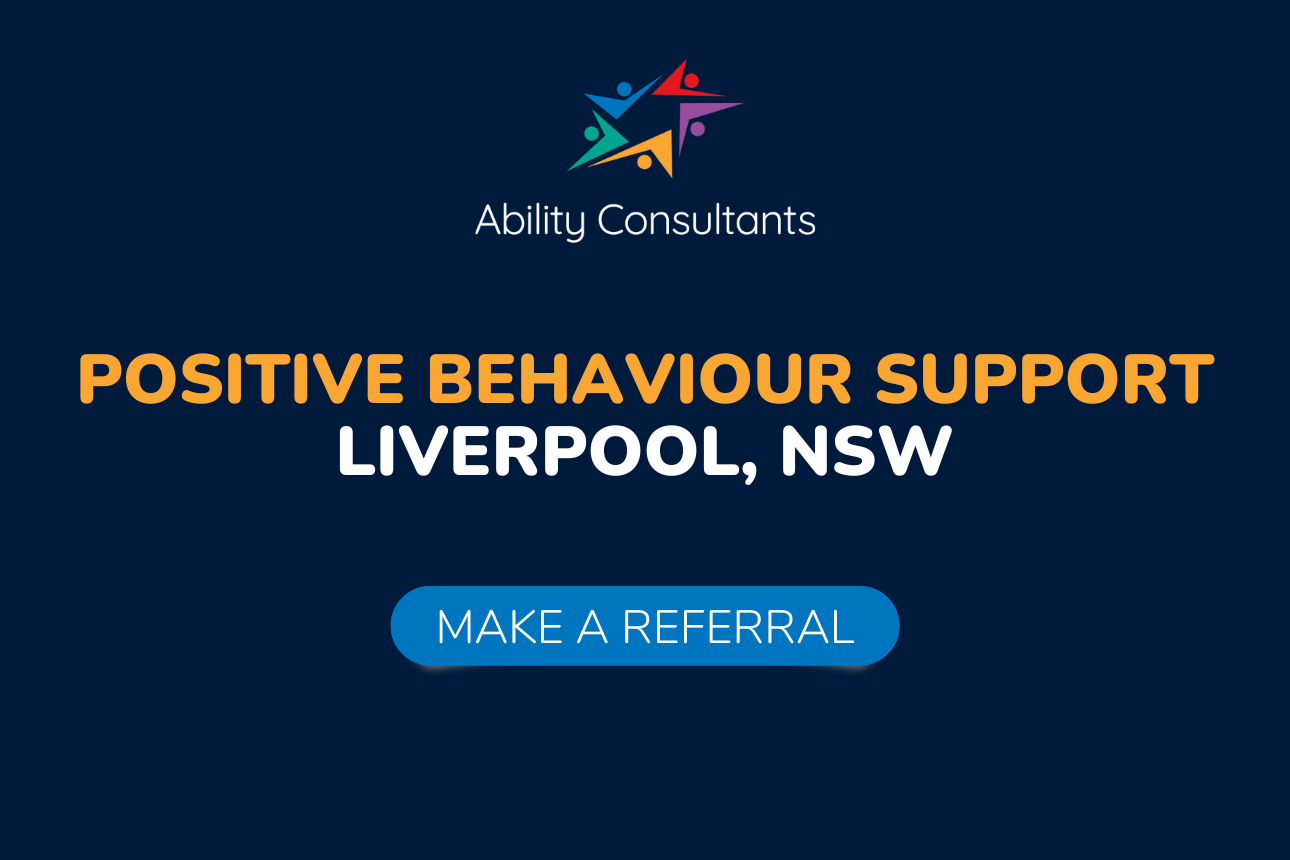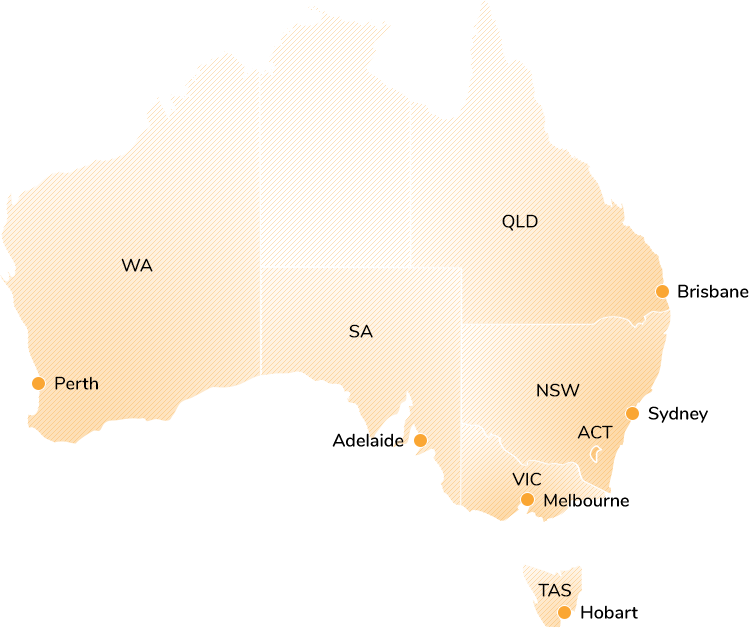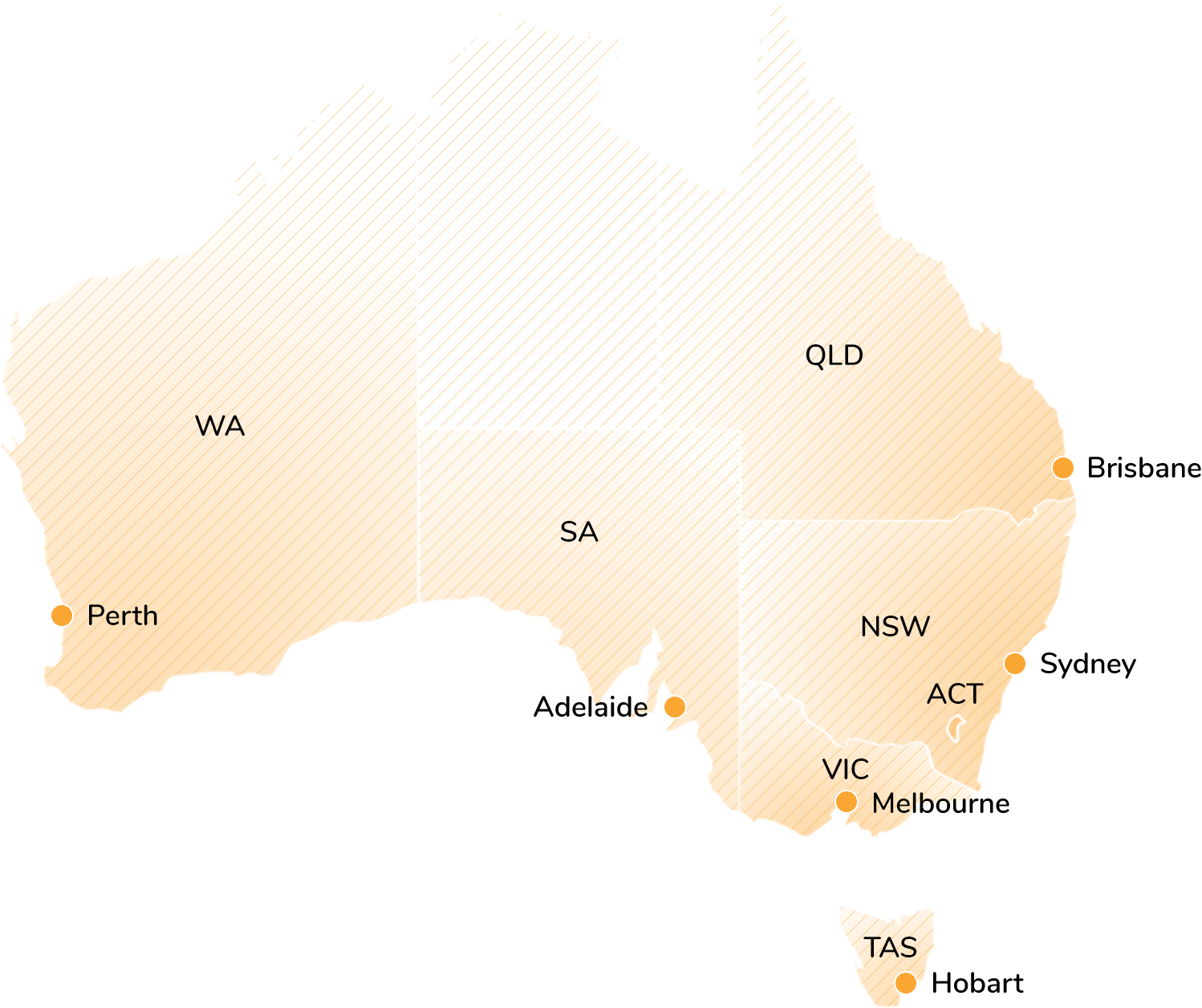Positive Behaviour Support in Liverpool, NSW: Meet Becki, PBS Practitioner

Are you looking for Positive Behaviour Support in Liverpool, South West Sydney?
If you’re ready to get started with Positive Behaviour Support in Liverpool, NSW, please feel welcome to make a referral. If you’d like to learn more about Positive Behaviour Support in Liverpool, read on!
We’re pleased to introduce Becki, Behaviour Support Practitioner and Team Leader at Ability Consultants.
Becki supports NDIS participants across the lifespan, from early childhood through to adults and seniors. In addition to being a behaviour support practitioner, Becki is a registered psychotherapist who has completed a Master of Counselling and Psychotherapy.
Meet Becki, Behaviour Support Practitioner in Liverpool, South West Sydney
Hi Becki, tell us about you!
I was born in Zimbabwe and I lived in Sydney before moving to the Northern Territory for a few years. I moved back to Sydney and transitioned from school counselling to Positive Behaviour Support.
In the counselling space, I worked one-on-one with students and also provided some interventions with their families. I also engaged in place-based counselling that involved going to homes, taking a holistic approach and counselling with the family.
I really like that Positive Behaviour Support allows me to keep working in that space, that I could transfer my skills, work with people from all different backgrounds and keep supporting families.
I’ve also previously worked in high school teaching, but while working in school counselling I realised I loved that so much, just working with one client at a time, I found that really fulfilling. I’ve also previously worked in aged care, where I loved the interaction of working with residents and their families.
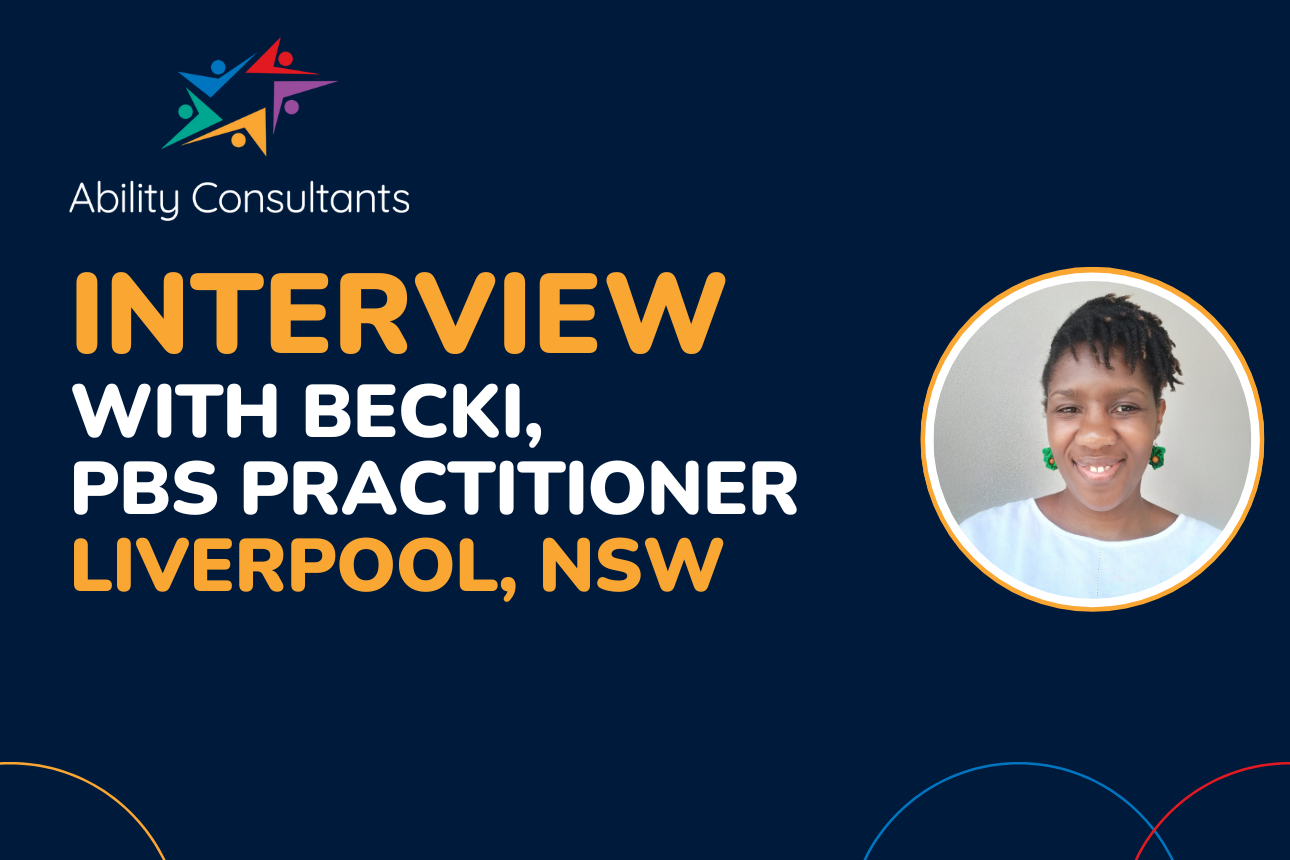
You used to live in Darwin?
I really loved Darwin — if you've never been, go up and visit Darwin. It’s beautiful and sunny. We loved it, we looked forward to the dry season and then when it came, we looked forward to the wet season, I found it just balances out perfectly.
What drew you to the field of Positive Behaviour Support?
Family and life balance and wanting to make a difference.
What do you love most about working as a PBS practitioner?
Seeing the difference that my work makes to families and participants.
Reminding people of the good things they are doing. It’s easy to focus on the negative — I help families take a step back and see that they get it right a lot of the time.
Families might come to us in crisis and lose sight of the good they are doing, so part of my role is to help them see those moments — to see when the things they are doing are working, and that some days there are no incidences reported. Sometimes we take what is working there and implement the strategies in different environments — sometimes it’s just about consistency.
I listen, we review what is working and see if we can get that combination of strategies that are working to work in different places or environments. This then helps us develop a good bag of tools to use.
Life in Liverpool, South West Sydney
Tell us about Liverpool and South West Sydney.
It’s family-friendly, with a rich mix of culture and representation of what Sydney is like. We have a diverse range of food from different cultures and often have food festivals.
Can you tell us about accessible recreational activities or tourist attractions in South West Sydney?
- Liverpool Regional Museum showcases local history and entry is free.
- The Fairfield Showground in Prairiewood hosts festivals and carnivals including the Fairfield Easter Show and Fairfield Markets.
- Fairfield City has three leisure centres in Cabravale, Fairfield and Prairiewood. The Fairfield Leisure Centre offers quite a few facilities including an Olympic-sized pool, heated indoor pool, water park, sports courts, gym and fitness studio. They also offer exercise physiology and personal training to NDIS participants. The swimming pools at Fairfield Leisure Centre and Cabravale are equipped with hoists and aquatic wheelchairs are available for use.
- Western Sydney Parklands includes a number of walking tracks and parks. Their website describes each track including noting which tracks are suitable for wheelchairs and mobility scooters, such as Pimelea Loop.
- A 170-year-old Southern oak tree, Bland Oak, can be found in Oakdene Park in Carramar.
- Chipping Norton Lakes offers quite a few parks including Black Muscat Park, which includes a playground, walking track, sheltered barbecue and picnic areas.
- Casula Powerhouse Arts Centre showcases a collection of art and hosts concerts, theatre, workshops and other events. The building is wheelchair accessible with accessible car parking near the front entrance of the arts centre.

About Positive Behaviour Support and its impact
How can Positive Behaviour Support improve a person’s quality of life?
Positive Behaviour Support (PBS) can assist people of all ages. An example of how PBS can support young people with disability is by supporting them as they transition out of the school environment.
When young people with disability are no longer school-age, they leave their familiar, daily school routine and the people they see there. This may lead to difficulty engaging socially when they leave school. They might find it difficult to find the right day program, create consistent routines and find the right support worker.
The transition can be difficult but maintaining that social aspect of life, forming relationships and being in the community can support a person’s self-esteem, overall health and wellbeing.
If they find it difficult to engage in the community, they may become withdrawn and isolated, preferring to stay at home.
As a behaviour support practitioner, I can support young people as they transition out of the school environment. In one case, I was able to support a young person to engage in their community through small steps. They started by going to the front door to gradually having the door open, watching people go past, going outside the door to enjoy the sunshine to sitting in the car near their local skate park or watching horses in a field.
Behaviour support practitioners can also support people with disability as they seek to find the right support worker. I’ve seen how finding the right match can make such a significant difference, with commonalities such as language and finding their own way to communicate. In one case, a participant’s confidence increased to the point that he no longer wanted family members to come to his community outings.
How can Positive Behaviour Support assist a child or teenager with Autism Spectrum Disorder (ASD)?
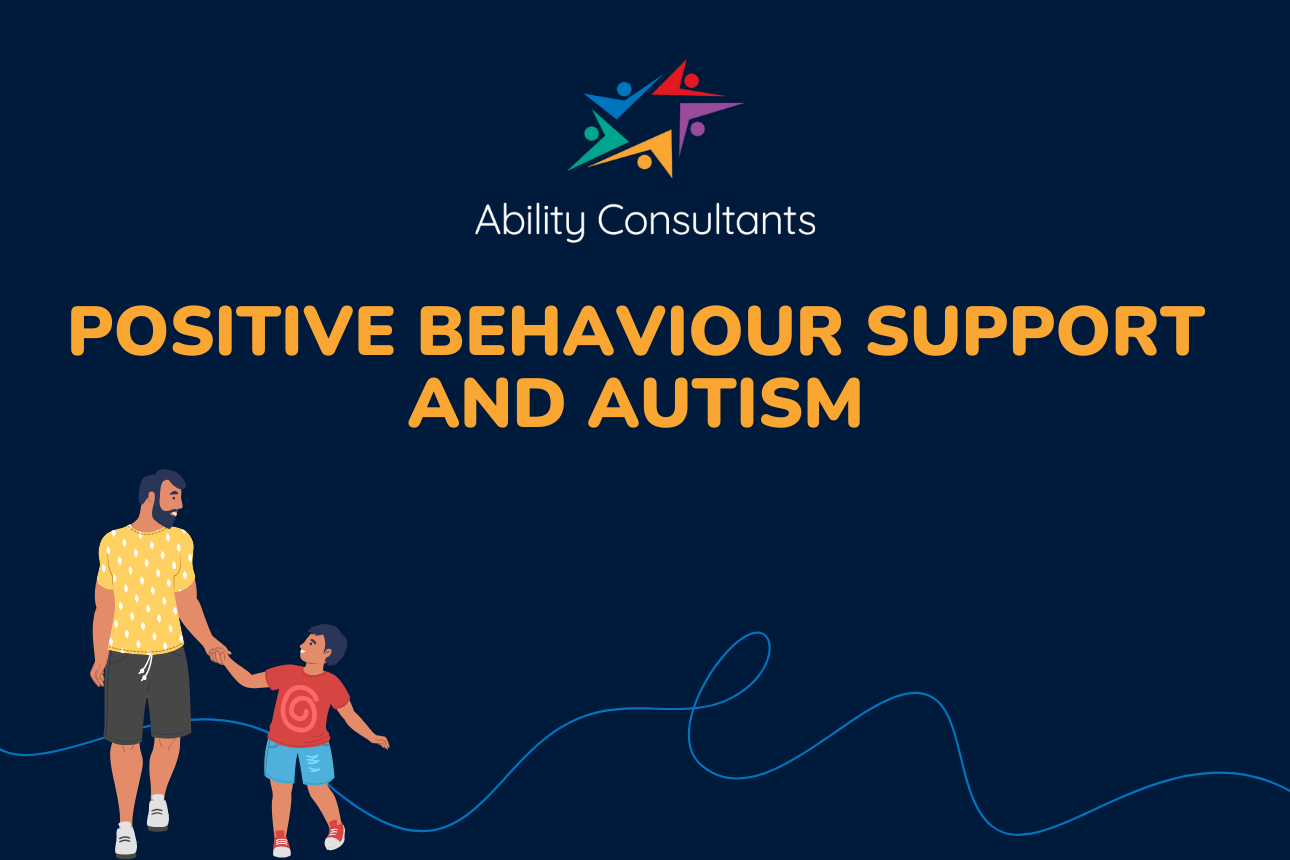
Knowing how Autism Spectrum Disorder presents for the participant is critical because it has a wide range of presentations.
For example, if a person with autism or intellectual disability engages in repetitive, uncontrollable behaviours such as excessive use of hand towels or toilet paper, or consuming food excessively, we might look at whether or not they understand what is enough, what is okay and what is too much.
One strategy I worked on with a family was to help their family members understand if something was too much, too little or just right. We had visuals around the house, at school and their day program.
We made sure everyone was using the same terminology, “Okay, that was just right”, or “This was just too little, a little bit more.” and we’d show examples at each step, such as one pump of soap or, we’d notice the participant has taken two pieces of paper towel and we’d say, “Are you still a bit damp? Okay, take one more. That's just right.”
Positive Behaviour Support Plans for Adults
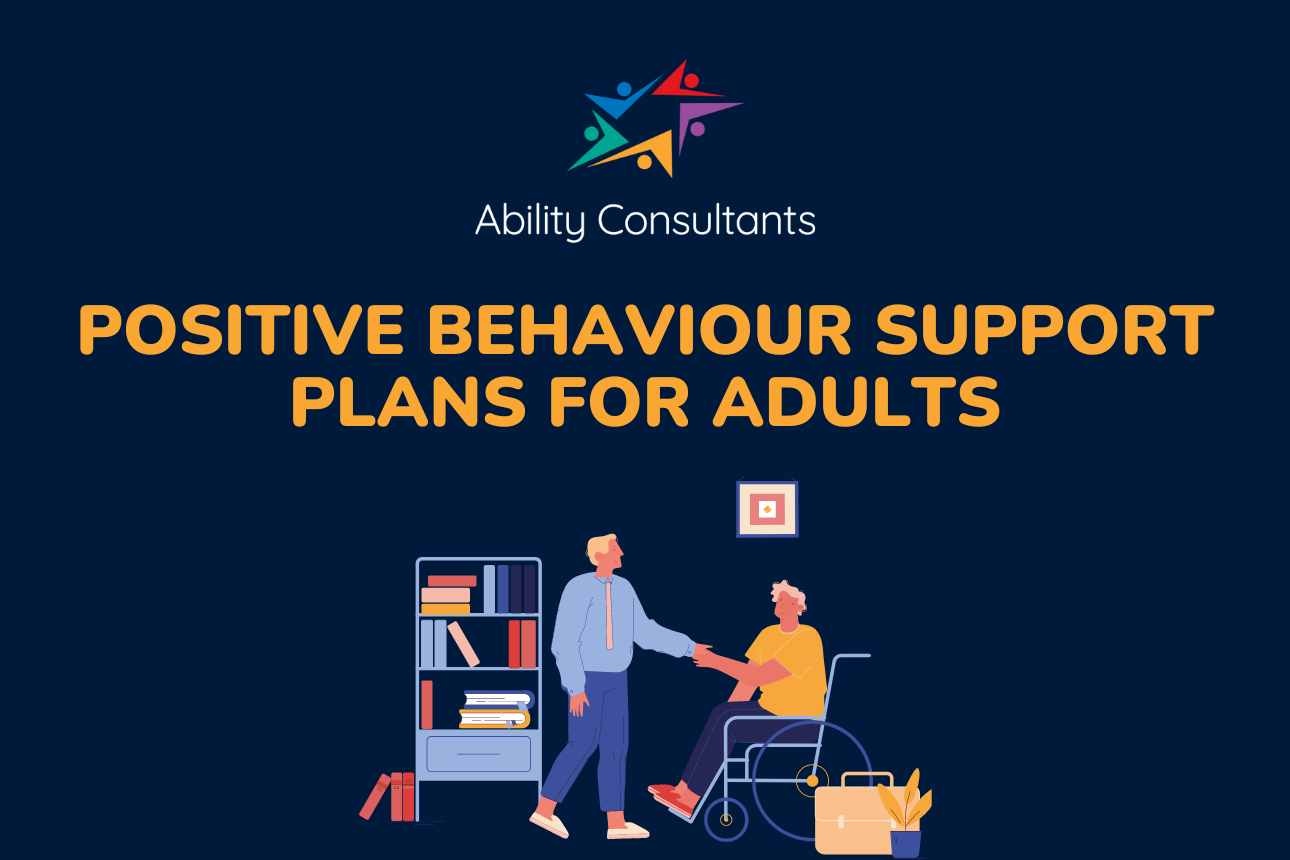
Tell us the steps involved when creating a behaviour support plan for adults.
As behaviour support practitioners, the steps we take to create a person-centred Positive Behaviour Support Plan (PBSP) will vary with each participant. We take a person-centred approach by communicating with a participant and collaborating with their other supports which may include a speech pathologist, occupational therapist, physiotherapist, dietician, psychologist and general practitioner.
Let’s take the example of an adult with intellectual disability who engaged in self-harm, increasing in intensity from punching themself in the face to screaming and repetitively head-banging on walls and surfaces.
Their PBS practitioner would complete a Functional Assessment Interview and collaborate with the participant and their other supports to determine when behaviours are occurring, where, how, who is there and what is happening in the environment.
Their behaviour support practitioners would conduct interviews, observations, data collection, formal assessments and implement strategies to manage behaviours of concern such as self-harm or physical aggression.
We would create a hypothesis to help their support team understand that all behaviour is communication. Once we understand the function of a behaviour, we are better able to support the participant and their supports with strategies to help reduce the frequency, duration, and intensity of behaviours of concern and build on skills.
Their behaviour support practitioners would conduct interviews, observations, data collection, formal assessments and implement strategies to manage behaviours of concern such as self-harm or physical aggression.
We can never be 100% sure of what a person is trying to communicate through a behaviour of concern, but based on data collected, we can hypothesise. If we hypothesise that they are engaging in the behaviours of concern because they are trying to communicate sensory needs, we consider how they can best communicate their needs without hitting themselves or others and how can we help them have their sensory needs met in more appropriate ways.
One strategy could be to increase or further develop their vocabulary. Another is that a behaviour support practitioner can collaborate with the participant’s occupational therapist to do a sensory profile to identify if a participant is understimulated or overstimulated by specific stimuli. In one case, we implemented deep pressure strategies such as a weighted blanket or wearing a vest to help regulate themselves. Another strategy is a butterfly hug, which is a self-administered technique for bilateral stimulation.
Positive Behaviour Support in Aged Care
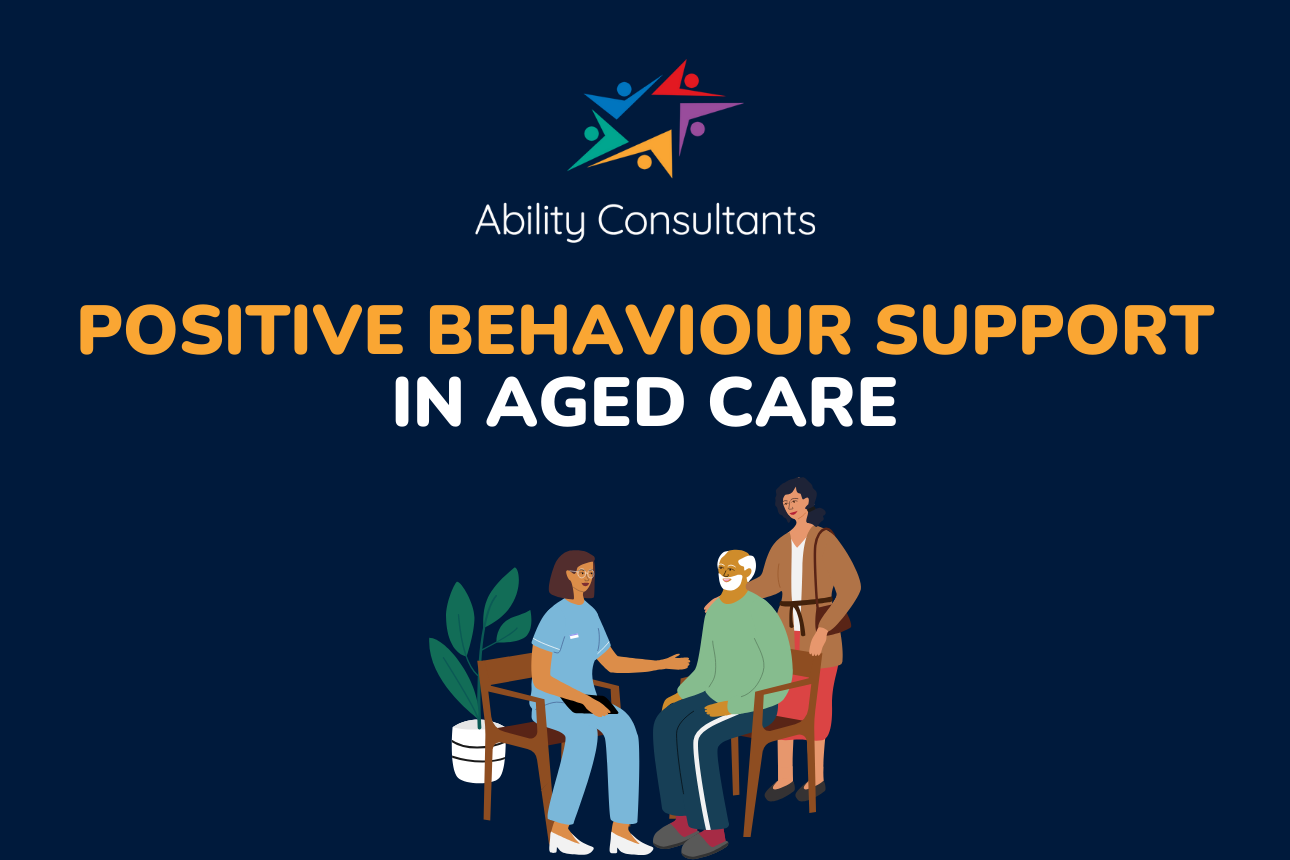
How Positive Behaviour Support can help in an aged care setting?
It’s important to have a plan in place and train a person’s support staff in an aged care setting, including the clinical nursing, kitchen and laundry staff and everyone involved in the care of a resident. They all need to understand the functions of a person’s behaviour of concern and recognise how understanding their diagnosis could make a difference in increasing their quality of life.
For example, maintaining choice and independence is important and residents living in aged care might engage in sleep preferences that don’t align with meal times or kitchen staff hours. This can present food safety challenges for residents and staff and behaviours of concern may occur. An example of a strategy that could be implemented is the provision of food which can be left at room temperature for longer periods and left in a place that is physically accessible to residents who use mobility aids.
Positive Behaviour Support in Liverpool, South West Sydney
Which suburbs do you provide Positive Behaviour Support in South West Sydney?
I support NDIS participants in Liverpool, Cabramatta, Canley Heights, Canley Vale, Carramar, Fairfield, Villawood, Georges Hall, Chester Hill, Bass Hill, Panania, Revesby, Yagoona, Bankstown, Prestons, Leppington, Oran Park and Campbelltown.
We also support NDIS participants all over Sydney, with behaviour support practitioners based throughout the metropolitan area, including more practitioners in Sydney’s South West. You can read about our team here.
How to access Positive Behaviour Support in Liverpool, NSW
How can NDIS participants in Liverpool get started with Positive Behaviour Support?
Please feel welcome to make a referral for Positive Behaviour Support on our website. You can do this anytime. You can make your own referral, or a member of your support team can make a referral on your behalf.
If you have any questions about Positive Behaviour Support, please feel welcome to call our team on 1300 694 625 or send a message using our contact form.
About Positive Behaviour Support
Ability Consultants is a Registered NDIS Provider in NSW. We create freedom and social connection through easy access to Positive Behaviour Support and psychology.



